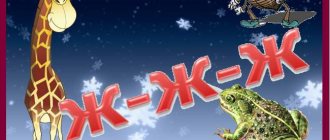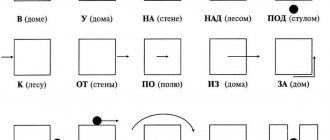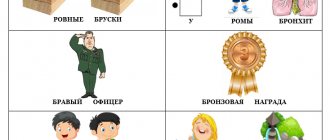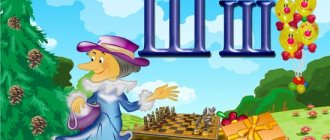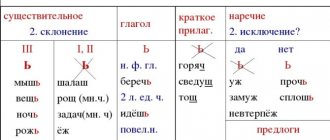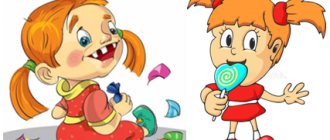Automation of the “Ch” sound in words
We pronounce the words, making sure that the sound “Ch” is pronounced correctly.
Exercise 1
- Doctor, rook, crying, rich man, kalach, trumpeter, jock, laundress, successful, problem solver, ball, hot, key, prickly, combustible, lichen, trousers, thorns.
- Daughter, night, barrel, daughter, hummock, nochka, kidney, durable, kvochka, milky, locks, ray, mighty, lucky, heap, Bug, pen, granddaughter, better, habit, quotes.
Task 2
- Game, name, egg, water, brick, brown, sword, lie down, oven, speech, take care, stove, river, buckwheat, sheep, ring, bridle, forever.
- Tanks, badges, zucchini, shoes, start, cloud, bugs, bunches, spiders, heels, flour, handmade, hoop.
The age of the child and the readiness of his speech apparatus
Schematically, a child’s speech development can be divided into stages.
Stage 1. Preparatory
The baby's age is up to 1 year. At this time, an important moment in the baby's development is humming and babbling. At first, sounds appear involuntarily, and by 5 months the child learns to imitate and respond to adults.
Stage 2. Pre-school
Lasts from 1 to 3 years. During this period, children begin to speak in monosyllabic phrases (instead of “Grandma, go,” they say “Baba, di”). Until the age of two, the vocabulary of objects and verbs increases (up to 24 months, the vocabulary is 90-100 words).
After two years, work begins on the quality of speech, and a clear pronunciation of most sounds is formed.
In the pre-preschool period, parents should contact a speech therapist if the child does not put words into short sentences.
Stage 3. Preschool
Lasts up to 7 years. By this age, the child’s active vocabulary includes 3000 words. At 3-4 years old, the baby can still replace some sounds (ts, ch with t), soften consonant sounds.
By the age of 5, softening should pass, whistling and hissing sounds are formed.
By the age of 6, the child learns to pronounce the sounds R and L, and complex, well-constructed sentences appear in speech.
Stage 4
At 7 years old, a child’s speech should be a full-fledged means of communication. Children not only pronounce all speech sounds correctly, but also distinguish them by ear and know how to analyze them. Conjunctions and allied words appear in speech; there are practically no errors in pronunciation. After several comments, the child analyzes the speech and corrects mistakes.
5th period. School
Lasts from 7 to 17 years. At this time, speech, both oral and written, is brought to perfection. The age period from 7 to 9 years is considered critical. This is explained by the fact that after 9 years of age, a child who has no experience of verbal communication becomes unable to learn.
By the age of 11, all phonetic errors in pronunciation disappear.
Automation of sound [H]card file for speech therapy (senior group)
Exercises for automating the sound Ch: isolated, in syllables, words and sentences.
Automation of the sound Ch begins with the easiest tasks for the baby.
Sing the “Merry Little Engine Song.”
Say the sound Ch on one exhalation several times: ch-ch-ch...
Repeat the reverse syllables with the sound Ch.
Ach-och-uch-ych-ich-ech-och-yuch-yach.
Repeat the reverse syllables with consonant clusters:
Achk-ochk-uchk-ichk-ichk-echk-echk-yuchk-yachk acht-ocht-ucht-ycht-icht-echt-yucht-yucht-yacht
Repeat straight syllables with the sound Ch.
Cha-cho-chu-chi-cha
Repeat the syllables where the CH sound is between the vowels.
Acha-acho-achu-achi ocha-ocho-ochu-ochi ucha-ucho-uchu-uchi icha-icho-ichu-ichi
Repeat straight syllables with consonant clusters.
Wha-wha-wha-wha-wha-chma-chmo-chmu-chmi-chmu
Repeat words with the Ch sound at the end of the word.
Ach: scarecrow, tractor, weaver, rich man, kumach. Pts: night, daughter. Teacher: powerful, viscous, drawling. Ich: game. Ech: sword, flow. Yach: ball.
Repeat words with consonant clusters.
Ach: pack, wheelbarrow, dacha, problem, problem book, mast, pitching, badges, successful, zucchini, shoes, start.
Pts: barrel, dot, daughter, kidney, hummock, glasses, butterfly, fishing rod, pipe, twig, night, cap, duck, slippers, night, Vovochka, kvochka, girl, mail, soil, locks, vase, jars.
Teacher: bunch, bug, granddaughter, cloud.
Ich: bird, egg, button, water, newcomers.
Ych: bulls, quotes.
Ech: stove, sheep, T-shirt, Tanechka, Petechka, Vanechka,
Anya, dream, bridle, forever.
Barley: barley.
Repeat the words where the CH sound is in the middle of the word.
Cha: head of cabbage, cloud, melon. Cho: tank, bull, bunch, badge, zucchini, shoe, barrel, bunny, spider. Chu: I want rubber, pearls. Chi: balls, sheepskin, bunny, ball, mighty, odorous, donut, hare. Che: student, teaching, textbook. What: study, soaked, baked, liver, overnight, smoked, bakes, flows.
Repeat the words where the CH sound is at the beginning of the word.
Cha: tea, seagull, teapot, shepherd, cup, child, teapot, vat, bowl. Chu: miracle, cast iron, cast iron, forelock, eccentric, cast iron, wonderful, Chukotka, sensitive. Chi: siskin, siskin, decorous. Che: check, suitcase, chasing, whose, Czech, champion, nonsense. What: rosary, clear, even. Cluster of consonants: smack, read.
Repeat words with two Ch sounds.
Lentil, tap dance, Chukchi, cap.
- Repeat the phrases.
Mommy's hat new T-shirt Anya's ball berry filling night butterfly wild duck cast iron stove thin twig soft sheepskin Vanya's bunny soft slippers dark cloud comfortable shoes tea cups smart student leather suitcase duck egg oak barrel cast iron bathtub fragrant honey new textbook
Repeat the sentences.
Three words. The student will buy a textbook. Vovochka is driving a car. Mommy is cooking zucchini. The girl can read. There is a duck on a hummock. Pupils read books. Children are fixing a car.
Four words. Vanechka is thinking about the problem. There are buttons on my daughter’s blouse. Student Vanya has textbooks. The bug approaches the booth. Anya has a wonderful bunny.
Five words. The girl has a butterfly in a jar. Vovochka has some water in a barrel. A girl is drinking tea at the dacha. The spider has a web on a branch. Bulls drink water from barrels. A girl reads a book about butterflies. The bird has chicks in its nest. The bird has a house on a branch.
Six words. Vovochka and Vanechka give water to the bulls. A bull walks along, its side is like a zucchini. There is a cast iron in the stove, and lentils in the cast iron. Students are taught to bake donuts in the oven. Tanechka and Manechka have new shoes.
Seven words. Mommy has two daughters: Tanechka and Anechka. Anya has a cap and a T-shirt in her suitcase. This is Vanya's bunny, and this is Vovochka's bull.
Repeat the proverb.
Learning is the path to skill.
Repeat and guess the riddles.
Barrel after barrel is pulled from the bag. (Lotto)
We walk at night, We walk during the day, But we won’t go anywhere. (Watch)
He hums: “Moo-moo-moo,” I don’t understand who this is? (Cow)
It flows, flows - it won’t leak out, Runs, runs - it won’t run out. (Creek)
Repeat the verses.
The bunny has a badge, On the badge is a zucchini. A. Khmeleva
Birdie, birdie, Drink some water! Water in a barrel, Barrel on a hummock. A. Khmeleva
(based on the book by E. N. Spivak, Automation of sound Ch)
Automation of the sound “CH” in pure tongues
We pronounce pure phrases, ensuring the correct pronunciation of the sound “Ch”.
Exercise 1
- Yuch-yuch-yuch, Yuch-yuch-yuch - Olya lost her key.
- Ach-ach-ach, Ach-ach-ach - a black rook walked across the field.
- Ach-ach-ach, Ach-ach-ach - I have a roll of bread in my hand.
- Ech-ech-ech, Ech-ech-ech - Seryozha has a shield and a sword.
Task 2
- Och-och-och, Och-och-och - night has come.
- Uch-uch-uch, Uch-uch-uch - this is a ray.
- Ich-ich-ich, Ich-ich-ich - you have cake on you.
- Yach-yach-yach, Yach-yach-yach - the kids are playing with a ball.
Task 3
- Cha-cha-cha, Cha-cha-cha - they called a doctor to Sasha.
- Chu-chu-chu, Chu-chu-chu - I knock with a hammer.
- Chi-chi-chi, Chi-chi-chi - we baked rolls.
- Che-che-che, Che-che-che - the cat is sitting on the shoulder.
Task 4
- Chi-chi-chi, Chi-chi-chi - the sun has warm rays.
- Chok-chok-chok, Chok-chok-chok - here's a funny hamster.
- Ichka-ichka-ichka, Ichka-ichka-ichka - here’s some water for you.
- Chok-chok-chok, Chok-chok-chok - black spider.
Automating the “Ch” sound in sentences
We pronounce sentences, making sure that the sound “Ch” is pronounced correctly.
Exercise 1
- Mom pours tea. There are shards on the floor. Whose forest stream are you, whose? The boy caught a siskin. A girl is reading a book. The boy is driving a wheelbarrow. Our Tanya is crying loudly. The spider weaves a web.
- I'm learning a rhyme. I'm reading a textbook. I type on a typewriter. I'm swinging on a swing.
Task 2
- The girls have balls. Olechka was cured by a doctor. Helen plays with a ball. The boys run to the river. The boy has brown gloves. The bug growled in the booth. The calf drinks some water.
- The boys were swinging on a swing. There is a wheelbarrow without a handle in the garden. The girl dropped the ball. The hen laid an egg. Ninochka is a neat girl. A butterfly flew into the window. The squirrel jumped onto the Christmas tree.
Tongue exercises
Language exercises are divided into static and dynamic.
Static complex:
- "Spatula". Relax your tongue and place it on your lower lip. Stay in this position for 10 seconds (the edge of the tongue should touch the corners of the lips).
- “The point of a needle.” Remove the tongue from the mouth, straighten and tense - the tongue at this time should be even and narrow.
- “Angry cat.” Place the tip of your tongue against your lower teeth and touch the middle of your tongue to your upper palate. Stay in the position for half a minute.
Sound culture of speech in the middle group of kindergarten
Dynamic complex:
- “Punishment for the tongue.” Stick out your tongue and place it on your lower lip. Press your tongue with your lips and say five-five-five.
- “Watch.” Stick out your tongue and stretch it to one ear, then to the other. Keep the entire speech apparatus in tension.
- “Swing”. Stick out your tongue and pull it alternately towards your nose and chin.
- "Horse". Click your tongue, imitating the blows of a horseshoe. The middle of the tongue is always pressed to the palate.
- "Little Turkeys" Run your tongue back and forth across your upper lip so that you make the sound bl-bl. The speed of movement gradually increases.
Articulation gymnastics
It is best to perform all exercises in front of a mirror so that the child can see how he performs them. Each exercise is performed at least three times.
- “Window.” Pull your lips forward as much as possible and give them a square shape. Make sure that the corners of your lips do not touch each other.
- “Pancake.” Smile as widely as possible. Place your tongue on your lower lip, relax and count to 10. The tongue should stretch across the entire width of the lip, but you don’t need to reach it out too far, just enough to cover the lip.
- "Painter". Stretch your lips in a smile, open your mouth slightly, and reach your upper palate with your tongue. Make smooth movements, as if using a brush, from the teeth to the throat.
- “Brushing our teeth.” Smile and make movements with your tongue that imitate brushing your teeth. Be sure to ensure that your tongue reaches the gums and does not run along the bottom edge of the teeth.
- "Cup". Stretch your lips in a smile, stick out your tongue and reach your nose. Remain in position for up to 10 seconds.
- “Delicious food.” Open your mouth and lick your upper lip with your tongue. Movements should be made from top to bottom, not from side to side.
- "Air football" Pull out your lips with a tube. Blow on the cotton wool, but your cheeks should not swell. Blow for 10-15 seconds.
We recommend: Articulation gymnastics for the sounds Ш and Ж.
Lip exercises
- “Grimaces of a Clown.” Keep your lips smiling. In this case, the lips should be tense, and the teeth should not be visible. The duration of the exercise is 15 seconds.
- “Fence.” Smile again, but at the same time close your teeth and expose them. Hold the position for 10 seconds.
- “Tube”. Pull your lips into a tube and hold for a third of a minute. The teeth don't connect.
- "Bagel". Round your lips and pull them forward slightly. Hold in position for 15 seconds.
To achieve good articulation, exercises need to be alternated, changing the sequence each time.
Automation of the “Ch” sound in syllables
i-ch, e-ch, yu-ch, i-ch, e-ch
We pronounce the syllables, making sure that the sound “Ch” is pronounced correctly.
Exercise 1
- Ach - ach - ach, Ach - ach - ach.
- Och - och - och, och - och - och.
- Uch - uch - uch, uch - uch - uch.
- Ych - ych - ych, Ych - ych - ych.
Task 2
- Yach - yach - yach, Yach - yach - yach.
- Ech - ech - ech, ech - ech - ech.
- Yuch - yuch - yuch, Yuch - yuch - yuch.
- Ich - ich - ich, Ich - ich - ich.
- Yoch - yoch - yoch, yoch - yoch - yoch.
Task 3
- Ach - och - uch, Ach - och - uch.
- Ych - yach - yoch, Ych - yach - yoch.
- Yuch - ich - ech, Yuch - ich - ech.
- Ach - ech - yach, Ach - ech - yach.
- Och - uch - yuch, Och - uch - yuch.
Task 4
- Ych - ech - ach, Ych - ech - ach.
- Uch - yoch - ich, Uch - yoch - ich.
- Ech - yuch - och, Ech - yuch - och.
- Ich - uch - yoch, Ich - uch - yoch.
- Ich - yach - uch, Ich - yach - uch.
